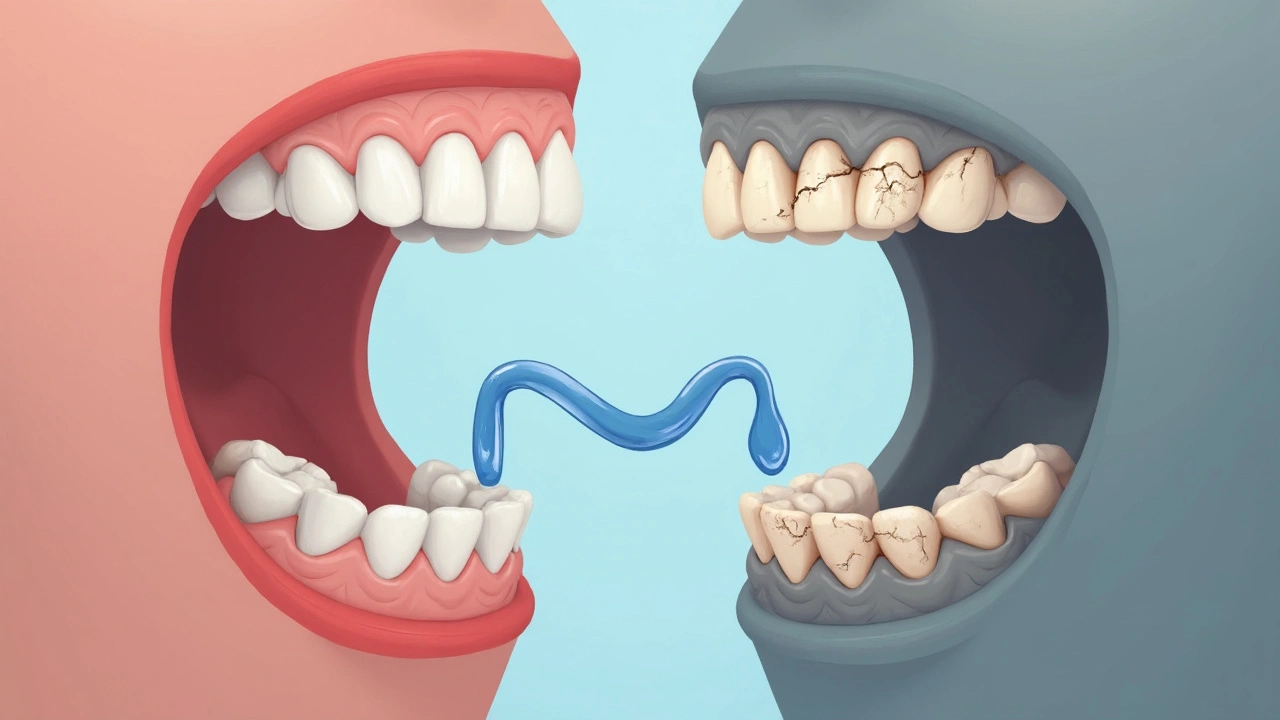Saliva: Why It Matters, How It Works, and Simple Tips for a Healthy Mouth
Ever wonder why your mouth feels wet even when you’re not drinking anything? That’s saliva doing its job. It’s more than just spit – it’s a multitasking fluid that helps you taste, speak, swallow, and keep your teeth safe. When saliva gets low or runs wild, you’ll notice sore throat, bad breath, or trouble chewing. Below we break down the basics and give you clear steps to keep your saliva in top shape.
What Saliva Actually Does
First off, saliva is 99 % water, but the rest is a cocktail of enzymes, antibodies, and minerals. The main players are:
- Amylase: starts breaking down carbs right in your mouth.
- Lysozyme and IgA: fight germs, lowering infection risk.
- Calcium and phosphate: rebuild enamel after you eat.
- Mucins: make the fluid sticky so food slides down smoothly.
All of this happens without you thinking about it. Your brain sends signals to salivary glands whenever you see, smell, or think about food – that’s why the smell of fresh coffee can make your mouth water.
When Saliva Gets Out of Balance
Too little saliva (dry mouth or xerostomia) can be caused by meds like antihistamines, certain antidepressants, or even dehydration. Symptoms include cracked lips, a burning feeling, and trouble wearing dentures. On the flip side, excess saliva can happen after surgery, with nausea, or when you’re on some anticholinergic drugs.
Saliva isn’t just a comfort thing; doctors use it for diagnostic tests. A simple saliva sample can reveal hormone levels, infection markers, or drug usage without a needle. That’s why keeping the glands healthy matters for accurate test results too.
Easy Ways to Keep Your Saliva Flowing
Here are three no‑fuss habits you can start today:
- Stay hydrated: Aim for 8 cups of water a day. Sipping water throughout the day keeps the glands lubricated.
- Chew sugar‑free gum: The act of chewing stimulates the glands, and the sweetener Xylitol also helps protect enamel.
- Watch your meds: If you notice a dry mouth after starting a new prescription, ask your doctor about alternatives or a saliva‑boosting rinse.
Bonus tip: Avoid excessive caffeine and alcohol, which can dry out your mouth, and try a balanced diet rich in fruits and veggies. The natural acids in citrus can actually prompt a quick saliva surge, but rinse with water afterward to protect enamel.
Remember, a moist mouth isn’t just about comfort – it’s a key part of digestion, immunity, and even how well you taste food. Give your salivary glands a little attention, and you’ll notice fewer dental trips, easier swallowing, and better overall health.

Ever wondered why your mouth feels dry sometimes? It’s more than just thirst. Saliva plays a huge part in keeping our mouths healthy. Without enough saliva, our teeth and gums can suffer, leading to increased dental issues. Understanding how saliva affects oral health can keep you smiling comfortably.
- Read More
